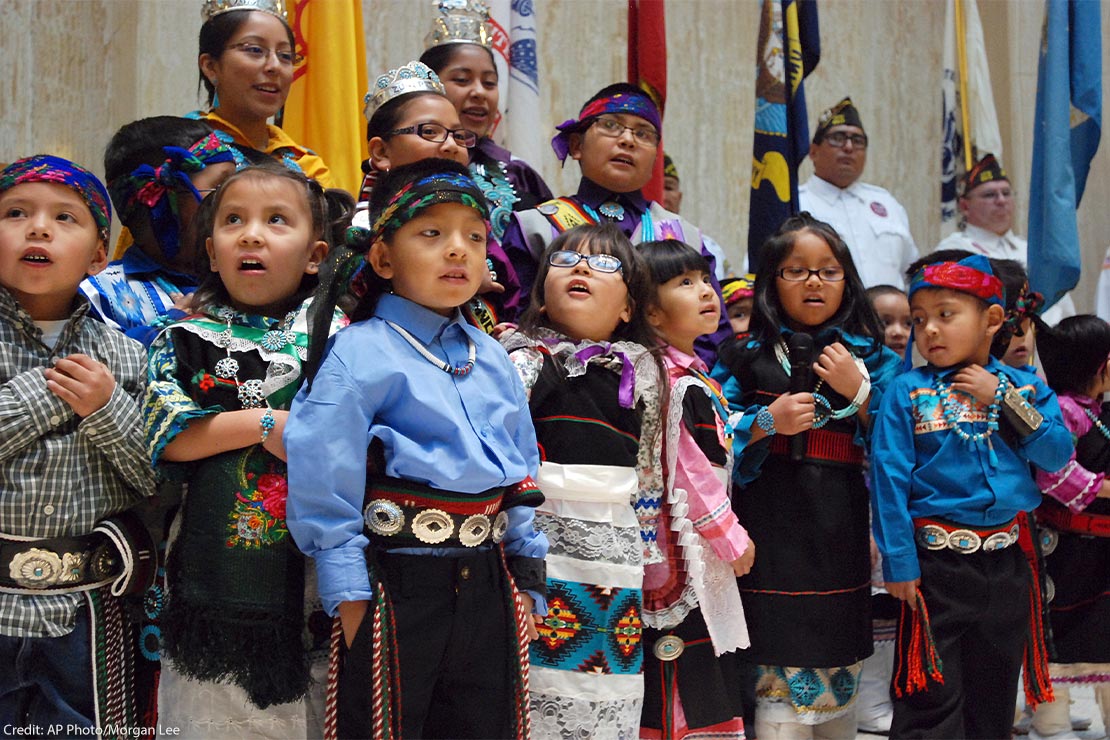Since European settlers arrived on the shores of what is now known as the United States, federal and state governments, intent on seizing Indian lands, have sought to undermine and threaten the existence of tribes through the forced separation and assimilation of Native children. By severing Native children from their families, tribes, and culture, colonizers believed they could stamp out Indigeneity and erase tribal people altogether. As with any nation, the future ceases to exist if children are prevented from carrying on the languages, traditions, and knowledge passed down from each generation to the next.
This tool of assimilation and genocide has been wielded against tribal nations and Native children repeatedly throughout history, and it is happening again now.
The Indian Child Welfare Act (ICWA) — a law that aims to protect Native children from forced removal from their families, tribes, and culture and preserve tribal sovereignty — is currently under attack and at risk of being overturned by the U.S. Supreme Court. Congress passed ICWA in 1978 to address the nationwide crisis of state child welfare agencies tearing Native children from their families and placing them in non-Native homes, in an attempt to force Native children to assimilate and adopt white cultural norms. Before ICWA, public and private agencies were removing 25 to 35 percent of Native American/Alaska Native children from their homes, and 85 percent of those children were placed in non-Native households.
The tools of assimilation and genocide have been wielded against tribal nations and Native children repeatedly throughout history, and it is happening again now.
Overwhelming evidence has found that being removed from homes and disconnected from culture, tradition, and identity profoundly harms Native children. The Indian Child Welfare Act requires state courts to make active efforts to keep Native families together and to prioritize the placement of Native children within their families and within tribal communities — where their cultural identities will be understood and celebrated.
This November, the U.S. Supreme Court will hear oral arguments in Brackeen v. Haaland, a case that challenges the constitutionality of ICWA. If the Supreme Court rules ICWA unconstitutional, it could have devastating consequences for Native children, families and tribes while simultaneously putting the existence of tribes in jeopardy. That’s why the ACLU and the ACLUs of Northern California, Alaska, Arizona, Maine, Montana, Nebraska, New Mexico, North Dakota, Oklahoma, South Dakota, Texas, Utah, Washington and Wyoming filed an amicus brief with the Supreme Court today urging the court to uphold the constitutionality of ICWA.
ICWA aims to address the forced separation of Native children and families and represents a small step toward acknowledging the centuries of genocidal violence that underpin this case. Beginning in the early 1800s, the architects of the Federal Indian Boarding School Program designed the program to erase the Indigenous identities of Native people. The government snatched children as young as four years old from their families and sent them to militarized boarding school institutions designed to destroy their Native identities and culture, often hundreds of miles away from their tribal homelands.
Any markers of their Indigeneity — language, clothing, traditional hairstyles, and even their names — were prohibited in these institutions. Indian boarding schools were not simply places where Native youth were stripped of their culture: many children died at these schools from outright neglect, malnutrition, untreated illness, and as a result of physical violence carried out against them.
The National ACLU and several ACLU affiliates filed an amicus brief with the Supreme Court today urging the court to uphold the constitutionality of the Indian Child Welfare Act (ICWA.)
While boarding schools were largely shuttered by the mid-1900s, the philosophy lived on: Native children were better off living with white families, even at the expense of their mental, physical, and spiritual wellbeing.
In 1958, the Bureau of Indian Affairs created the Indian Adoption Project. The project’s explicit goal was to assimilate Native children into white culture through adoption and the intentional destruction of Indigenous family units and tribal communities. During this era and continuing today, practices rooted in ethnocentric stereotypes operating under the guise of “child protection” resulted in the baseless separation of thousands of Native children from their families and homelands.
It is incomprehensibly heinous that — in order to build the country we all live in today — federal and state governments targeted Native children, robbing those children, their families, their communities, and their tribal nations of everything it meant to be Indigenous.
Brackeen v. Haaland is the largest threat to Native children, families, and tribes before the Supreme Court in our lifetimes. If ICWA is overturned, states would once again be allowed to tear Native children from their families, tribes, and culture while simultaneously threatening tribes’ very existence. The legal arguments made by the plaintiffs challenging ICWA in Brackeen undermine key tenets of federal Indian law, and threaten many other laws upholding tribal sovereignty.
Tribal sovereignty is the right of tribes — 574 currently recognized by the federal government — to make and be governed by their own laws. This sovereignty is inherent, as Native Nations existed long before the creation of the United States. Hundreds of treaties have guaranteed tribal nations the right to self-govern. Through these treaties, Native Nations gave up their right to millions of acres of land that would become the United States in exchange for promises to tribes, including the guarantee that lands “reserved” for tribes would be governed by the tribes in perpetuity. The outcome of Brackeen v. Haaland could put centuries-long legal precedent upholding tribal sovereignty — including tribes’ right and ability to preserve their unique cultural identities, raise their own children and govern themselves — in jeopardy.
Native families have a right to stay together, to care for their children, and to preserve tribal culture by ensuring access to their cultural identity, language, and heritage. The Supreme Court must protect this right and uphold the constitutionality of the Indian Child Welfare Act.

